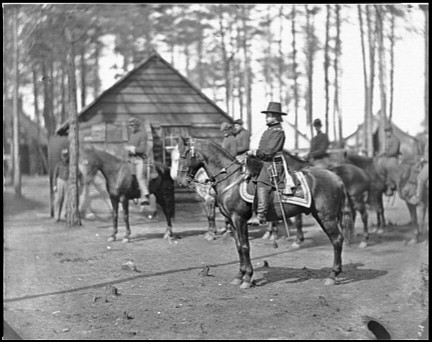| 1863 Chancellorsville Gettysburg |
Can It Get
Worse?
|
|
Winter Quarters at Brandy Station, Virginia. As
Chief Quartermaster of the army he had his pick of the horses from the thousands that were
supplied to the army. This one is a particularly handsome animal.
|
January 1863 would see yet another
change of command for the Army of the Potomac. General Joseph Hooker
would be the third commander of the huge army. He would wisely choose to retain the
invaluable assistance of the Chief Quartermaster, Brigadier General Rufus Ingalls. By 1863 Rufus would have well trained and competent people to help him transport and supply the large army. Early in the war there were very few 'professional' quartermasters. Now Rufus could with, justifiable pride, report: "It was almost as easy to maneuver the trains as the troops." Gettysburg Lee and the Army of Northern Virginia took a bold step into Union territory in late June. One reason is that northern Virginia had suffered from both armies and the land was pretty well picked clean of useful supplies, especially food.. Gettysburg, Pennsylvania was where the events and armies happend to converge into the decisive battle of the war. The rumor among the Confederates that shoes were stored in the town may have been the spark that lit the fuse. The Confederate army was woefully short of shoes and no shoes on a march makes for very uncomfortable troops. Robert E. Lee was at a disadvantage with his cavalry missing. JEB Stuart had taken his troopers around the Army of the Potomac again, but this time he failed as the eyes of the army. Along part of his ride they were within a very short distance of Washington. They managed to capture a Union wagon train that was without escort. The prize was not worth Lee's lack of intelligence from his cavalry.
How to Deal With Mobile Warehouses in a Battlefield? A marauding enemy or a retreating army does put unique requirements on the warehousemen. A bunch of wagons in the wrong place will be a problem. Ingalls' annual report for the fiscal year ending June 30, 1863 details how he managed the on-hand supply of the huge army:
|
|
| During the battle of Chancellorsville
General Hooker was injured while standing in the doorway of the Chancellor house.
That day the following messages were sent; one to William Rankin, Depot Quartermaster from
Rufus Ingalls. The gravity of his concern is obvious by the tone of the
message. Confederate General Stonewall Jackson would be wounded by friendly fire the
same day. HEADQUARTERS ARMY OF THE POTOMAC, May 4, 1863 - 12 m. Captain WILLIAM G. RANKIN, At Old Headquarters Army of the Potomac: Do not come up here yourself. Perhaps no one had better come just yet. Keep quiet; do not make any excitement. We are in great trouble, but we shall fight out. Do not communicate with Washington on the subject. RUFUS INGALLS, Chief Quartermaster. WASHINGTON, D. C., May 4, 1863 - 3.10 p. m. Major-General HOOKER: We have news here that the enemy had reoccupied heights above Fredericksburg. Is that so? A. LINCOLN. HEADQUARTERS ARMY OF THE POTOMAC, May 4, 1863 - 4.20 p. m. His Excellency the PRESIDENT: I am informed that it is so, but attach no importance to it. JOSEPH HOOKER, Major-General.
|
